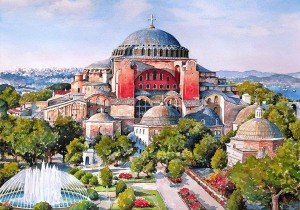 In last week’s Bulletin, because we remembered the Fathers of the first Six Ecumenical Councils of the Christian Church, I deviated from my thoughts on Sacred Tradition and presented a brief synopsis of each Council. These six Councils are the foundation of our faith and our Church embraces them completely and totally. In fact, they are a vital part of the Sacred Tradition to which we adhere and embrace.
In last week’s Bulletin, because we remembered the Fathers of the first Six Ecumenical Councils of the Christian Church, I deviated from my thoughts on Sacred Tradition and presented a brief synopsis of each Council. These six Councils are the foundation of our faith and our Church embraces them completely and totally. In fact, they are a vital part of the Sacred Tradition to which we adhere and embrace.
The pronouncements that these six Councils made are also the foundation of the CREED that we profess. While some Christians embrace the same Creed, they deny some of the tenants that are contained in this Creed. For example, we believe, when we mention in the Creed that Jesus was incarnate by the Holy Spirit and the virgin Mary and became man, that the virgin Mary is the Mother of God, the Theotokos. The Council of Ephesus decreed that Mary, because Jesus is one Person with two natures, must be considered the Mother of God incarnate. The Church does not see how Mary could be the mother only of the man Jesus.
This is what Sacred Tradition calls us to believe. There are, however, many modern Christian Churches that do not accept Mary as the Mother of God. They believe that she brought Jesus into the world but that she cannot be truthfully considered the Mother of God. Sacred Tradition, in maintaining the absolute unity of Jesus – fully God and fully man in one Person – tells us that she must be considered the Mother of God.
Further, Sacred Tradition has us embrace the belief that the Holy Spirit proceeds from the Father only and that, together with the Father and the Son is worshipped and glorified. This is how the original Creed was written. Western Christianity changed the wording, maintaining that the Holy Spirit proceeds from the Father and the Son since He is the energy (i.e., love and life) that binds the Three Persons in the Trinity so that there is only One God.
The Sacred Tradition that we embrace tells us that the Father is always considered the source of Life and therefore both Son and Spirit proceed from Him. This is how the Church originally expressed it and sought to maintain monotheism – one God – although composed of Three, Distinct Persons.
Some believe it is only a matter of semantics. We believe that a Creed composed by several Ecumenical Councils, should not and cannot be changed. Why? Because decrees by truly Ecumenical Councils are guided by God’s own Spirit. The Creed in the West was not changed by an authentic Ecumenical Council.
